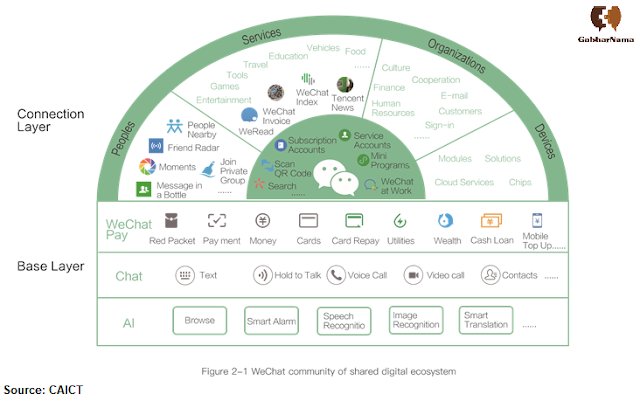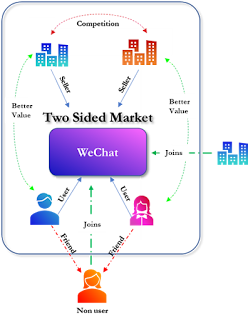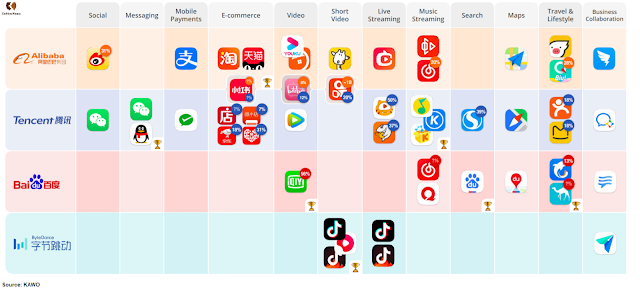We have just published the first episode of our podcast 'GabbarNama - Everything Tech and Money'. The following topics are covered in this episode:
- Major news updates
- Amazon launches new devices and gaming service
- US adds sanctions on Chinese chipmaker
- TikTok deal still not closed
- Spotify, Tinder join hands with Epic games against Apple
- Apple to launch iPhone 12 Mini
- Challenges for WeChat and Tencent
---------------------------------------------
Transcript:
Atul:
Hello Everyone, I am Atul, your podcast host and you are listening to the
very first episode of GabbarNama - Everything Tech and Money. If you are a
Tech Geek, want to be a Tech Entrepreneur, a Product Manager or just want
to keep yourself updated, this podcast is for you and you should consider
subscribing to it through the platform of your choice.
I am very excited today to take you through the stuff I have planned for
this first episode. In this episode we are going to talk about Tencent and
WeChat.

The real global tech giant of the 21st century may not be Google,
Facebook or Amazon, it would be Tencent. It’s one of the tech powerhouses
of China, the world's most populous country.
It is more valuable than Facebook and unlike Google, Facebook, Twitter - it has diversified sources of revenues and not fully dependent on advertisements.
Behind the scenes, it has been steadily investing across companies like Tesla, Reddit, Uber, Lyft, Epic Games (publisher of Fortnite), Snapchat
and so on. After all, owning a slice of potential billion-dollar company
will give you money and data for next investments. Want to know more?
Keep listening to the podcast till the very end where I have a certain
giveaway for the interested ones.
But first, let us start with the major news updates from the Tech world.
1. Major News updates
Amazon recently announced its next version of Echo smart speakers and has shifted to spherical design. It also announced launch of its gaming service called Luna complementing Twitch - its streaming service. Several new offerings from Ring were announced including car cameras and a drone that flies inside your home.
In the ongoing tech war, US has imposed export restrictions on top Chinese Chipmaker - Semiconductor Manufacturing International Corp. (SMIC) fearing that its diverting its chips and other products for military use.
In US, the TikTok case went to federal court over Trump's decision to ban the app from fresh downloads and has received a temporary injunction. There are still no signs that the deal with Oracle might get closed as ownership of data and source code still remain an open issue.
Spotify and Match.com (owner of dating app Tinder) have joined hands with others like Epic games to create an advocacy group that is protesting against the app store policies of Apple which includes charging 30% commissions on all app payments. BTW, Google also announced mandatory use of its play store billing for Android apps.
Apple is supposedly going to launch the next version of iPhones with 5G capability in next month. It will include iPhone 12, iPhone 12 Max and iPhone 12 Mini.
Now back to our Tencent story.
2. What is Tencent and why does it matter?
Tencent was founded in Shenzhen, China, in 1998. It has more than 1.2 Billion users (which is 15% of world’s population) using WeChat during any given month and its mobile payment services process more than 2 billion payments per day.  Let me first run you through the background of Tencent.
Let me first run you through the background of Tencent.
It is the world's largest gaming publisher with games like PUBG in its kitty. Its businesses derive around 57% of revenues from Value Added Services (VAS) where users can purchase avatars across games and social networks, music and video subscriptions, 26% of revenues from payments businesses, mutual funds, insurance, loans etc. from which they take a fixed percentage of transaction value as their fee and only 16% from advertisements by showing advertisements and video-ads to the users. Unlike global giants where entire revenue is supported by advertisements, Tencent has a lot of scope for expanding that revenue stream.
3. How did Tencent become this big?
Tencent has its roots in the first successful cross-platform chat product ICQ that was created in Israel in 1996. The founders of Tencent copy-pasted it and launched the Chinese version called OICQ which became sudden hit in China. Parent company of ICQ, Mirabilis was soon bought by AOL and forced Tencent in copyright claim to change name of its software from OICQ to QQ.
There were few reasons for success of ICQ:
- ICQ was the first in many aspects. It could tell you when your friends or family were online. The software had network effects which means that the incentive of using the software grows as more of your friends start using the software and as a result more people start using it. The effect keeps on multiplying.
- In the 90s, the global technology sector was nothing but booming. Windows 95 had released, the technology had become accessible to everyone. Companies had also started providing services which were free to use like free email accounts. Marginal cost of extra users was dropping to zero as processing powers of servers started increasing.
Few factors also played in favour of Tencent:
- China had undertaken several massive projects like development of Shenzhen from fishing town to a Special Economic Zone which had led to its sudden boom. China had also started the “Golden Bridge Project” which was the blueprint to develop commercial internet backbone in the country. The founders of Tencent used to work directly with the telecom authorities and could see the scale at which the electronics industry had shifted its base from Hong Kong to Shenzhen. The government was now promoting IT based companies to grow which was a good sign for future of sector.
- Tencent had the first-mover advantage in China and could duplicate the network effects of ICQ in China. China was just not on any company’s expansion graph as there was a market entry barrier in terms of language (very few people were familiar with English or the English alphabets) and the value of users was low due to low spending power (2.1 M users but not of much use to the companies - Chinese advertisement market had not yet developed), and software piracy. The western companies preferred expanding to Europe or Americas first.
In 1998, personal computers were limited in China and people majorly
used Cyber cafes. This also came as a boon for Tencent as the software
once downloaded and installed by anyone could be used directly.
By 2001-02, the bubble in US tech market had burst and many companies had closed. In China, Tencent was also facing challenges. They had used the early funding acquired from Venture Capital (VC) firms. Naspers came as a lifesaver for Tencent as it agreed to invest $32 million for a 46.5% stake in Tencent and provided it a new lifeline. This is similar to $20 million investment of Softbank in Alibaba which also became very successful. Although people were using Tencent's chat system but it was not able to generate much revenue. They could not risk charging for software as competition could crop up very easily.
From 2002 onwards, Tencent kept on “getting inspired” by the successful global
products and kept on copy-pasting them in China. It copied a Korean company CyWorld
and found a way to make money by selling virtual goods like stickers and avatars.
Tencent launched gaming, search engines, social networking websites and
even a copy of PayPal - all based on winner ideas from South Korea, US and
Japan. They also started copying winner South Korean games (market
affinity helped there). They realised that market was shifting from paid games to free-to-play games and they could ensure steady supply of new games as well as profits if it invested in the gaming startups working on those models. They made their first big investment in Riot Games, the publisher of League of Legends.
Rise of Mobile Internet
By 2008,
the company was already among the top-3 most visited websites of China.
The mobile internet was already on a rise with the launch of smartphones
and the cheap Chinese handsets. For many people in China, their mobile
phone was the first personal device to connect to the
internet. Tencent had also started
investing in other successful models of the west like Kingsoft (Microsoft), JD.com (Amazon), Sogou (Google).
Its biggest revenue stream through the early 2000s had been value-added
services - making over 70% of its total revenue and the rest contributed by
online advertisements and e-commerce.
By 2010, Tencent had started to face competition from Alibaba
and others which were providing similar offerings.
In order to survive and for long term growth, Tencent had to evaluate new
business offerings. Copying and imitation could lead to this far and now
the business needed innovation. But what is innovation? It can be
incremental improvements or incorporating ideas from different domains. Ma
Huateng, also known as Pony Ma, the co-founder of Tencent has always told
in his interviews that Innovation is the result, not the cause.

One small group evaluated such innovations and came up with the idea of
Weixin, which later came to be known as WeChat. The company
by then still hadn’t been able to tap user data or contextual
advertisements. They realized mobile would lead the next wave (traffic to
their websites had already indicated that). They also created an app
store for Android making it privy to the overall app data as well - which
app is trending, and massive hits etc. and act as a gateway to the user
preferences.
WeChat first became popular once it added the ability to send virtual
red-packets to friends, similar to exchanging gifts during
New year. Confident
that mobile was the next big thing, the company started integrating all
existing services and the user adoption kept on growing due to the ease of
access and availability of other services. Tencent, combined the best of
everything into single app. Once it received the licence for its online bank,
it also started offering FinTech products into WeChat like loans,
insurance etc. In parallel, it was expanding globally through investments
in gaming companies as well as investing in other tech startups like app
based transportation, electric cars, fantasy gaming, edutech and even
another superapp like Gojek. In all, it has invested in more than 700
companies but the full list isn't publicly available.
4. What makes WeChat successful?
Everyone using smartphones in China has WeChat. It is a Super App as it
is an All-in-One app. In addition to IM chat like WhatsApp, it is a social network, search engine, has music streaming, gaming, TV and videos streaming, e-commerce, taxis, payments, banking, and many more uses. It is like WhatsApp, Facebook, Google,
Spotify, Amazon, Uber, Netflix, AirB&B, Robinhood and many more
combined into one entity. All the functions you normally use within a
mobile phone are available within the app. So when a user starts using
this app, he can do everything within this app and doesn’t feel the need
to use any other app. The WeChat experience becomes like using a
smartphone and feels like an Operating System (OS).

WeChat has been successful to create a layer on top of phone’s software.
It provides a seamless and common experience across devices blurring the
differences between hardware and software across phones (1). No matter if
you are an Android user or an iOS user - the experience is just the same.
The UI and functions feel the same across devices and OS. So no matter if
you are switching handsets or the OS, you have that same UI, user
experience and utilities. As a result, for you everything beneath the
application is non-consequential.
Also, the government has been working for a long time on point based citizen-scoring system and WeChat plays a key role in that. A good citizen keeps company of good people, pays his obligations on time and remains loyal. All of these parameters can be rated by the data kept by WeChat and other companies. Hence, the company gets some freehand in conducting its day to day activities.
4.1. Network Effects of WeChat
Initially WeChat started as a one-sided market - catering to only one
side i.e. the users. It connected them and provided them a way to reach a group
of friends. There were positive network effects - having all friends using
the app will provide you more value in joining the app. WeChat could
charge users for virtual goodies and avatars.

Later on, they identified that businesses were also using the app to
reach customers. They added public accounts on it so that businesses could
register themselves and pay for certain activities. They eventually opened
the API access to developers providing ability to check weather forecasts,
book taxis, ability to pay and so on.

It created a two-sided marketplace wherein businesses have more
incentives of using WeChat as there are more users (cross-side network effects) and
users have more benefits (better value from more friends and seller competition - same-side and cross-side network effects). Only problem with
it is, it’s difficult to sustain it. Hence, Tencent has kept on adding new
services to it and keeps it under tight-control so that it’s very hard for
users to switch to other apps. For example, they won’t be able to pay via
WeChat pay.
5. Challenges for WeChat and Tencent
- Competition: The only sizable domestic competition comes to it from Alibaba which competes with it in multiple domains from E-commerce, banking to Cloud computing. Both are fierce rivals and have the blessings of the government with them. However, Alibaba has been more successful than Tencent in E-Commerce and Cloud Computing while Tencent leads in Social Networking and Gaming. However, few rivals come in between like Bytedance which has created a shift in what digital content users consume. Both Tencent and Alibaba keep on investing in such startups to remain insured and remain close to these companies by supporting with VC funding.
- Privacy and Censorship: There are words that just cannot be mentioned within chats by users. Tencent has to abide by the censorship rules of the country and keep on blocking keywords. Many of the games were blocked from publishing and the end-to-end encryption available in the majority of the western apps is totally absent. Many nations fear that the usage data can be accessed by the government. It has led the US to block WeChat from being downloaded within the country. A single order from any government can stop the reigns of Tencent.
- Remaining relevant: Tencent still hasn’t mastered the advertising piece of business or the AI part and needs to improve how it uses the user data to provide the right experience. So many businesses using WeChat are now questioning the user engagement on WeChat. Digital spending has already started declining due to Covid-19 and the impact will also be felt by Tencent.
However, I feel that the long term growth will be decided by the
M&A strategy of the company and it’s similar to finding pearls in the
ocean. Surely, the company has taken few leaves out of the books of
successful people like Warren Buffet. We'll see more when it comes up
again in our discussion.
That’s all for Tencent in this week's episode. But before we go, as a bonus material you can download the list of disclosed investments
that Tencent has made over the years from our website i.e. you can
download investment portfolio of Tencent from the link given in the
description.
We’ll be back in 2 weeks with a new story to share with you.
This episode of GabbarNama: Everything Tech and Money is brought to you by us. As you’ve made it this far we hope you are enjoying the show, you can show your support by sharing it with a friend who might enjoy it as well.
---------------------------------------------
Note 1: If we look at a mobile phone, how do we identify it? We
identify it with its Hardware and the Operating System (OS). Hardware is
slowly becoming a commodity in terms of utility that it provides and is
able to solve the common user problems. For example, all smartphones are
expected to have touchscreen displays, GPS support, front and back
cameras, internet support etc. Differences come only in terms of the
quality or speed depending on the price point of hardware. Otherwise,
all phones are able to provide a minimum basic requirement for the
user.
There are multiple ways to categorize hardware. Based on price, there
can be 3-4 major segments:
-
Feature phones
-
Entry-level smartphones or Smart Feature phones like Jiophone from India
-
Mid-price smartphones, and
-
High-end smartphones - iPhone, Samsung Galaxy Note Series
Feature phones were rudimentary phones and have been in decline for a
long time. Still, share of feature phones is 7-8% of global mobile
shipments. Rest of the phones are smartphones, have similar basic
hardware and provide computing power.
The major operating systems are Android and iOS. Android and its
derived versions take up around 88% of smartphone share due to the
openness of its platform and the low cost of usage. iOS is just
restricted to the iPhones.
---------------------------------------------
Bonus Material: We have compiled a list of startups where Tencent has invested over the years. You can get a free copy of the sheet here:



Great content. Really appreciate the investment portfolio list of Tencent that you have shared. I had been looking for this list all over the internet.
ReplyDelete